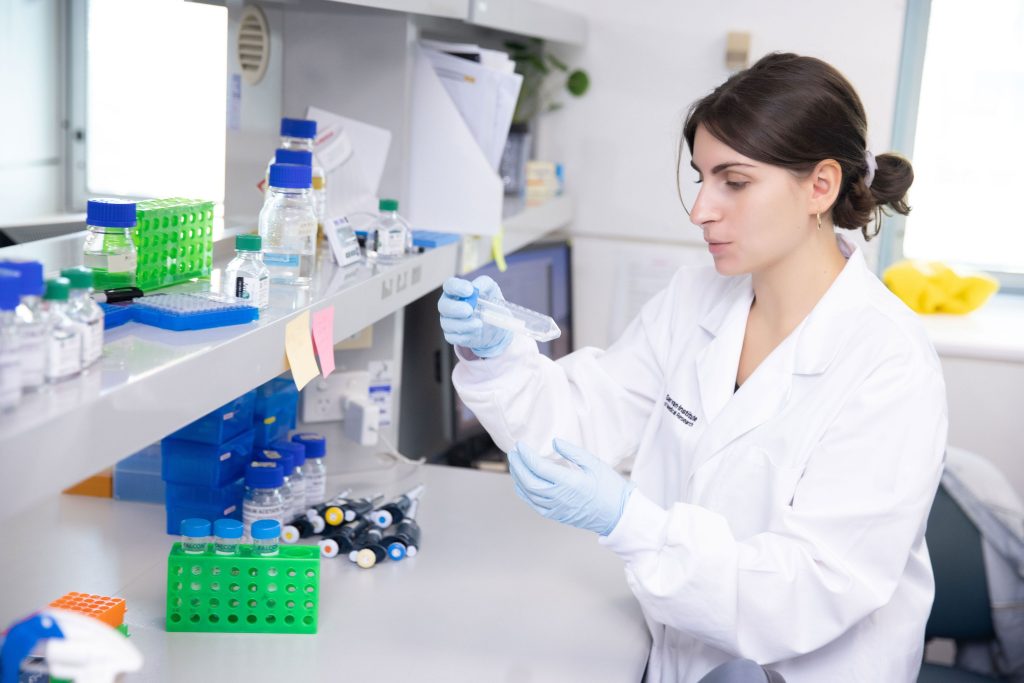By Charuni Pathmeswaran
Allegra Angeloni is pursuing a PhD in epigenetics at the Garvan Institute of Medical Research affiliated with UNSW. Prior to that she did her Bachelor of Advanced Science and majored in genetics and microbiology at UNSW and did her Honours also at the Garvan Institute. She is one of the UNSW Women in Science and Maths Champions Blog editors and was one of the finalists at the 2021 UNSW Three Minute Thesis (3MT) competition.
Can you briefly explain your current research?
I’m interested in epigenetics, which is very broadly defined as the study of chemical and structural modifications to DNA that impact the way genes are expressed without modifying the DNA sequence itself. Alterations to our epigenetics can result in diseases such as cancer, so it’s important that we understand how it functions. To do this, I research epigenetics in animals that are distantly related to humans, to identify strategies that have been retained through millions of years of evolution. This will help us gain insight into the fundamental mechanisms that control how our genes are expressed.
What excites you most about your work?
I enjoy studying gene regulation from an evolutionary standpoint, which I think is unique. I also like working with DNA from animals that are not as well studied. There is a lot we can learn about how our genes are regulated from weird and wonderful critters such as sponges, oysters, and sea anemones.

What do you find most challenging about your work and how do you tackle that?
At the beginning of my PhD, I found it difficult to wrap my head around bioinformatics, which is basically utilising computational strategies to answer biological questions. I don’t have much of a background in computer science, so it was a challenge to navigate initially. However, over the past few years, I’ve found myself quite enjoying using bioinformatics in my research. The excitement of obtaining biologically interesting results is what drives me.
What are your interests outside of science?
I have a book club with friends. We vote on a book each month and meet at the end of the month to discuss it. Through this book club, I’ve read genres that I wouldn’t normally, and I really love hearing diverse perspectives and opinions. Prior to lockdown, I was playing social soccer. I’m definitely not the best soccer player, but it’s nice to get my energy out after a long day in the lab and know that it doesn’t really matter how I play – it’s just about having fun. I’m also an enthusiastic baker. I love cooking (and eating) sweets.
Tell us about your recent 3MT experience
I found preparing for the UNSW Science One-Minute Thesis (1MT) quite challenging. I rehearsed it multiple times with friends and family from non-science backgrounds until they finally understood it. I was fortunate enough to win a prize at the UNSW Science Postgraduate Showcase and qualify for the UNSW Interfaculty 3MT competition. It was a really useful experience for me. Now, if I meet someone who asks about my research, I’ve got a three-minute speech ready to go!
What would you like to see change in the future for women in STEM?
I would like to see more women represented in senior positions. One barrier that many women face is the burden of unpaid domestic labour, in which they take on a disproportionate amount of childcare and household chores. It is no secret that academia is a high-pressure work environment, so it can be quite challenging to juggle a personal and professional life. I believe universities and institutes need to make a concerted effort to ensure that women (and men) are properly supported in their scientific careers.
Words of advice that you’d like to give to young women who are interested in pursuing a career in STEM?
It’s important to challenge yourself and to be okay with not succeeding at everything. I used to be nervous about trying something new because I was worried I wouldn’t be immediately good at it. However, I’ve come to realize that it’s one of the most effective ways to learn and grow as a scientist. If you try something and you don’t do it well, that’s perfectly fine and normal. You’ll likely find yourself surprised at what you do and don’t enjoy.
Follow Allegra on Twitter to learn more about the exciting science she does 🙂